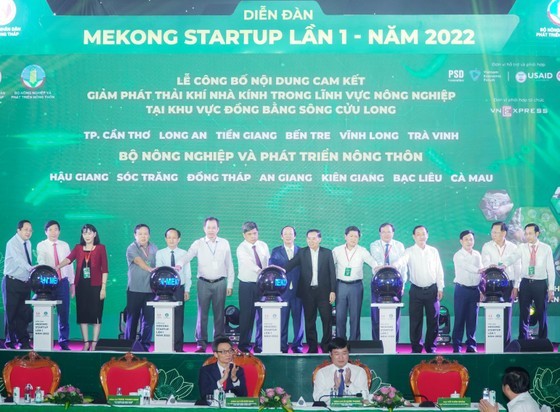 |
Representatives are performing the official ritual for emission reduction in agriculture. |
The two-day forum provided a valuable chance for local businesses and sponsors to introduce innovative startup products and projects aiming at reducing negative effects of climate change and economic transition.
In his speech, Vice Chairman of Ca Mau Province People’s Committee Le Van Su said that the potential for seafood development in the Mekong Delta, in particular Ca Mau Province, is quite high.
However, there must be short- and long-term solutions to boost innovation in the seafood processing chain here, along with an awareness upgrade to be greener in manufacturing and consuming goods. In addition, new industries such as seaweed processing should be focused on to lower emission.
He hoped that the Ministry of Agriculture and Rural Development review and adjust the planning for specialized aquaculture areas suitable for the demands of the local markets and export processing plants, especially areas for hi-tech shrimp farming and organic wild shrimp or rice shrimp farming. Seafood collection units should be developed correspondingly, and infrastructure investment must comply with the local production planning to better adapt to climate change.
The Vina T&T representative shared that ‘modern, circular, low-emission agriculture’ is not at all new if agricultural products are to be exported worldwide. In Vietnam now, there is not yet a national brand name for any fruit. Therefore, it is recommended to issue the country’s own fruit certificate for other nations to recognize and for a reduction of dependance on international organizations.
Chairman of Ben Tre Province People’s Committee Tran Ngoc Tam stated that globalization and free trade agreements have allowed produce of the Mekong Delta to approach highly potential markets in the world. Industry 4.0 and the green economy trend have basically changed the methods for socio-economic growth thanks to various advanced technologies being introduced so far.
Chairman of Dong Thap Province People’s Committee Pham Thien Nghia stressed that the public-private Forum, held by Dong Thap Province for the first time, was able to raise the awareness about climate change, emission reduction among the public, contributing to fulfilling the Government’s commitment with the world.
This Forum is also a place to gather and link the public and private sectors, especially innovative businesses in order to complete the task of establishing a greener, more sustainable agriculture in the Mekong Delta for more breakthroughs in the future. International organizations and domestic and foreign experts were called for to form a strong force to make agriculture more modern, circular, and less polluted.
Head Tran Cong Thang of the Institute of Policy and Strategy for Agriculture and Rural Development said that there must be innovation centers for partners to come and discuss new knowledge as well as materializing ideas. These centers could be comprehensive or specialized for industries. also, it is advisable to collaborate with international partners for training and idea materializing tasks.
In the Forum, Chairman Nghia and General Director of FPT Group Nguyen Van Khoa signed a cooperation agreement on comprehensive digital transformation and human resources training to boost innovative startup in Dong Thap Province.
Dong Thap Province People’s Committee, the Private Economic Development Research Board (Board IV), and associations of key industries have committed to increase collaboration between the public and private sectors to pour all possible resources into turning Dong Thap Province to a ‘Regional Center for Solutions on Lowering Emissions’ from 2023.
Representatives of provinces in the Mekong Delta, the Ministry of Agriculture and Rural Development, the Ministry of Natural Resources and Environment all perform a formal ritual to commit to greenhouse gas reduction in agriculture, and at least 30-prercent reduction on methane in farming activities in 2030.
Three discussion sessions on transforming the chains of rice, seafood, and fruits in the Mekong Delta into more modern and sustainable ones. Many practical presentations to improve the value of produce chains in the Mekong Delta were delivered, with a clear focus on digital transformation in agriculture.
An exhibition of produce using advanced technologies took place after that, with the participation of over 200 businesses in the fields of fruit, rice, seafood processing.
























